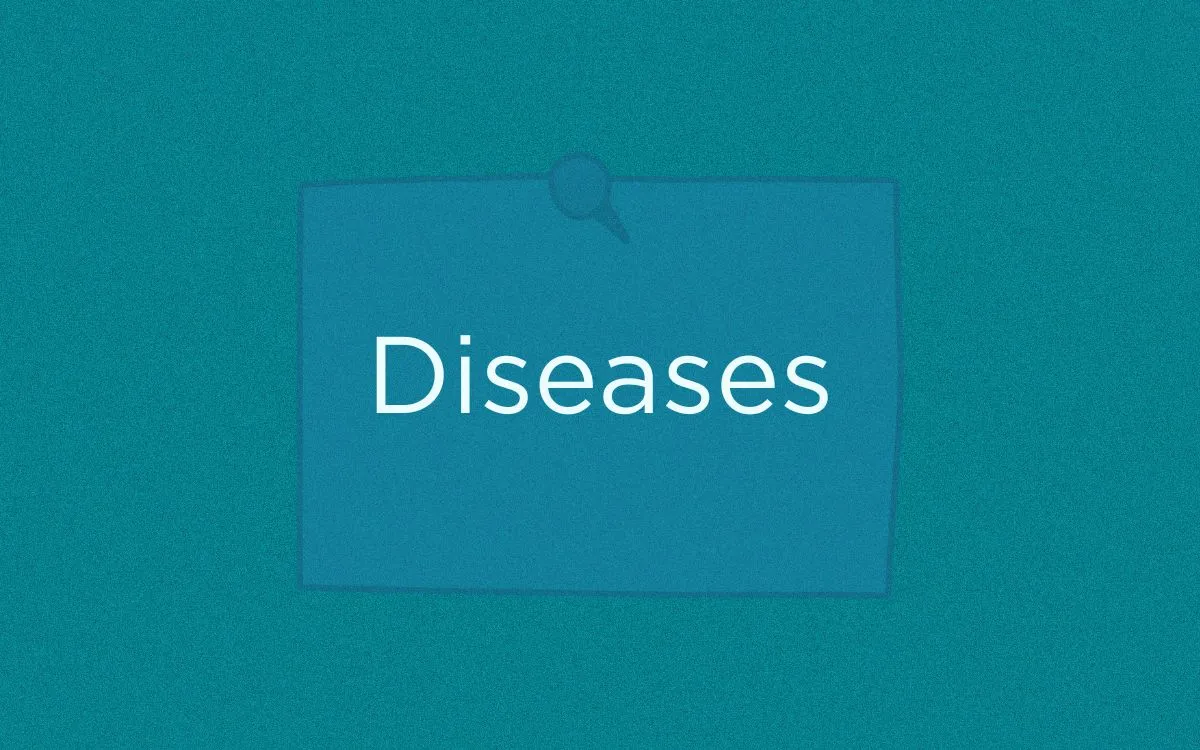
Disease names in English. Definitions and example sentences of diseases in English.
Whether you are a student, a healthcare professional, or someone who simply wants to expand your knowledge, this article is designed to provide clear and concise information about common diseases and health issues.
On this page, you will find detailed explanations, symptoms, causes, and examples of a wide variety of illnesses, from everyday ailments like the common cold to more complex conditions like diabetes and schizophrenia. Each entry is designed to be easily understood, providing simple definitions and example sentences to help you effectively grasp medical terminology.
acne
A skin condition that occurs when hair follicles become clogged with oil and dead skin cells, leading to pimples, blackheads and sometimes cysts.
Acne can be frustrating, especially for teenagers.
allergy
An immune system response to a foreign substance that is not usually harmful to your body.
During spring, Karen's pollen allergy becomes unbearable, causing her to sneeze and have watery eyes.
Alzheimer's disease
A progressive neurological disorder that leads to the degeneration and death of brain cells, causing memory loss and cognitive decline.
Her grandmother has Alzheimer's disease and sometimes forgets who her family members are.
anemia
A condition where there are not enough healthy red blood cells, or hemoglobin, in the blood, causing symptoms such as fatigue and weakness.
Due to her anemia, Lisa often felt tired and dizzy, prompting her doctor to recommend iron supplements.
arthritis
A condition in which one or more joints become inflamed, causing pain and stiffness.
Grandpa finds it hard to play the piano these days because of the arthritis in his fingers.
asthma
A chronic respiratory condition in which the airways become inflamed, causing shortness of breath, wheezing and coughing.
During gym class, Alex had to use his inhaler to relieve his asthma symptoms after running laps.
backache
Refers to pain or discomfort in the back.
Lifting heavy objects improperly can cause a backache.
bronchitis
A condition in which the tubes that carry air to your lungs become inflamed, often causing a cough and sometimes difficulty breathing.
Bronchitis makes it hard to breathe.
cancer
A disease in which abnormal cells in the body multiply uncontrollably, destroying surrounding tissues.
After months of unexplained fatigue and weight loss, Maria was diagnosed with cancer.
cold
A viral infection of the upper respiratory tract. Usually caused by rhinoviruses.
I caught a cold after walking in the rain.
cough
A reflex to clear the airways. It can be caused by a variety of factors, including a cold, flu, asthma or bronchitis.
John had a persistent cough that kept him awake at night.
chickenpox
Also known as varicella, chickenpox is a highly contagious childhood disease caused by the varicella-zoster virus. It causes an itchy, blister-like rash that appears on the face, chest, and back and then spreads to the rest of the body.
When Emily came down with chicken pox, she had to stay home from school for a week to avoid spreading the virus to her classmates.
depression
A mood disorder characterized by symptoms such as persistent sadness, apathy, and lack of pleasure in daily activities.
After losing his job, Mark fell into a deep depression.
diabetes
A chronic condition in which the body does not produce enough insulin or cannot use insulin properly, leading to high blood sugar levels.
Emily needs to check her blood sugar levels regularly because she has diabetes.
diarrhea
A digestive disorder characterized by frequent, watery stools. It can be caused by a variety of factors, including viruses, bacteria, parasites, or food poisoning.
After eating at the new restaurant, Sarah experienced severe diarrhea.
dizziness
Refers to a spinning sensation or unsteadiness. It is usually caused by factors such as low blood pressure, dehydration or neurological problems.
She experienced dizziness when she stood up too quickly.
eczema
A condition in which the skin becomes red, inflamed and itchy, usually due to an overactive immune response.
Her eczema flares up in cold weather.
epilepsy
A neurological disorder marked by recurrent, unprovoked seizures due to abnormal electrical activity in the brain.
Jane takes medication every day to control her epilepsy.
fever
A higher than normal body temperature. It can be a sign of infection, inflammation, or other medical conditions.
Despite having a fever, he insisted on attending the meeting.
flu
A respiratory infection caused by viruses. It can cause fever, cough, sore throat, muscle pain and fatigue.
The flu virus spreads easily through coughs and sneezes.
headache
A feeling of pain or discomfort anywhere in the head.
Stress and lack of sleep can often lead to headache.
hepatitis
Inflammation of the liver, usually caused by viral infections (such as Hepatitis A, B, and C), can lead to liver damage and potentially liver cancer.
Chronic hepatitis can lead to serious liver damage if not treated properly.
hernia
It occurs when an internal organ or tissue pushes through a weak spot or tear in the surrounding muscle or connective tissue.
He developed a hernia after lifting heavy furniture.
HIV/AIDS
HIV (Human Immunodeficiency Virus) attacks the immune system and if left untreated leads to the most severe stage of the disease called AIDS (Acquired Immunodeficiency Syndrome).
Using protection is essential to prevent the transmission of HIV.
hypertension
A condition in which the force of blood against artery walls is too high, which can lead to heart disease, stroke, and other health problems.
Eating healthy can help lower hypertension.
lupus
An autoimmune disease in which the immune system attacks its own tissues, causing widespread inflammation and organ damage.
Lupus symptoms can vary widely, including joint pain, fatigue, and skin rashes.
malaria
An infectious disease transmitted by mosquitoes, caused by Plasmodium parasites, causing fever, chills, and flu-like symptoms.
The researchers are working on developing a more effective vaccine to combat malaria.
measles
A highly contagious disease caused by the rubeola virus. It causes fever, cough and a red rash that spreads over the body.
After an outbreak of measles at the local school, health officials urged parents to ensure their children were vaccinated.
migraine
A type of headache that causes severe, throbbing headaches, often accompanied by nausea, vomiting, and sensitivity to light and sound.
Bright lights and loud noises often trigger migraines for him.
mumps
A viral infection that primarily affects the salivary glands, causing them to swell. It is contagious and spreads through respiratory droplets from coughing, sneezing, or direct contact with an infected person.
Vaccination against mumps is part of routine childhood immunizations.
nausea
Nausea is the urge to vomit. It can be caused by a variety of factors, including food poisoning, the stomach flu, or a migraine.
He took some ginger tea to help alleviate his nausea after the meal.
Parkinson's Disease
A progressive nervous system disorder that affects movement, causing tremors, rigidity, and slowness of movements.
She noticed the early signs of Parkinson's disease when she began experiencing tremors in her hands.
pneumonia
Infection that causes inflammation of the air sacs in one or both lungs, causing cough, phlegm, fever, chills, and shortness of breath.
He was hospitalized with pneumonia and had to undergo antibiotic treatment.
psoriasis
A skin disease that causes red, itchy scaly patches on the knees, elbows, trunk, and scalp.
He has been living with psoriasis for years.
schizophrenia
A serious mental illness characterized by detachment from reality, hallucinations, delusions, and disorganized thoughts and behavior.
People with schizophrenia may require long-term medication.
sinusitis
Inflammation or swelling of the tissue covering the sinuses.
Sinusitis often causes facial pain and pressure.
sore throat
A feeling of pain or irritation in the throat. It can be caused by a variety of factors, including the common cold, flu, strep throat, or mononucleosis.
She drank warm tea with honey to soothe her sore throat.
stomachache
Refers to pain or discomfort in the abdominal area, usually due to digestive issues or gastrointestinal problems.
He felt a sharp stomachache after eating spicy food.
stroke
A medical condition that occurs when blood flow to part of the brain is interrupted or reduced, depriving brain tissue of oxygen and nutrients.
After experiencing weakness on his body, he was rushed to the hospital where doctors confirmed he had suffered a stroke.
toothache
Refers to pain or discomfort around the tooth, usually caused by tooth decay, infection, injury, or gum disease.
She couldn't sleep because of a severe toothache.
tuberculosis
Bacterial infection that primarily affects the lungs, causing cough, fever, night sweats, and weight loss.
Coughing up blood is a severe symptom associated with advanced tuberculosis.


